WASHINGTON (AP) — One of America’s top military commanders met face-to-face with senior leaders of the Taliban, urging the longtime enemy not to interfere with the massive evacuation at the Kabul airport as the United States withdraws from Afghanistan, a U.S. official told The Associated Press.
Meanwhile, the U.S. was rushing thousands of troops back into Afghanistan on Monday to try to secure the airport for some of the tens of thousands of Americans, Afghans and others seeking to flee ahead of Taliban rule. Pentagon spokesman John Kirby said there were now 2,500 American forces at the airport.
Gen. Frank McKenzie, head of U.S. Central Command, warned the Taliban officials that the U.S. military would respond forcefully to defend the airport if necessary, a U.S. official said separately, speaking on condition of anonymity to discuss sensitive talks not yet announced publicly.
McKenzie’s session Sunday in Doha, Qatar, the base for long-running talks among senior Taliban political officials, Americans and others, underscored the swift rise in power of the Taliban, America’s opponent in 20 years of fighting, after a weeklong push in which the group captured control of Afghanistan.
The Taliban takeover comes two weeks before the date President Joe Biden had set to withdraw the last U.S. combat troops from Afghanistan and end the U.S. role in the war there. Emboldened by that withdrawal, the Taliban entered Kabul on Sunday, setting off chaotic scenes as foreign diplomats and Afghans rushed to the airport, one of the last avenues of escape.
At least seven people have died in three days of chaos at the airport, including two armed individuals killed by U.S. forces, and Afghans who fell from the wheel wells of a U.S. combat plane as it took off. Kirby said Monday that both civilian and military air operations were suspended for now, due to people on the civilian side of airport interfering with takeoffs and landings.
Kirby said the U.S. was sending still another battalion to try to secure the airport, but said the total intended U.S. deployments to safeguard the evacuations through the airport would remain at 6,000. He gave no details.
The U.S. official who revealed the U.S.-Taliban direct talks said that in the meeting on Sunday in Qatar, McKenzie and the Taliban agreed to establish a “deconfliction mechanism” — an arrangement by which evacuation operations at the airport could continue without interference by the new rulers of the country.
McKenzie is the senior commander responsible for the remaining U.S. forces in Kabul. As head of U.S. Central Command, he also is responsible for U.S. military operations in the greater Middle East, including Central Asia.
A U.S. defense official said American warplanes — which had been hitting Taliban targets during the withdrawal, in a failed effort to help Afghan forces block the Taliban blitz — were not currently conducting any airstrikes.
The official, who also spoke on condition of anonymity because the official was not authorized to discuss the matter publicly, added there was no sign Monday of any significant ongoing fighting by any forces of the now-routed U.S.-backed Afghan government. Afghan President Ashraf Ghani fled the country on Sunday as the Taliban entered Kabul.
The insurgent group said it would soon begin forming a new government. Its resurgence comes nearly 20 years after U.S. forces invaded Afghanistan to crush the al-Qaida plotters behind the 9/11 attacks. The Taliban government that had hosted al-Qaida was overthrown.
Less than a week after a U.S. military assessment predicted Kabul could be surrounded by insurgents in 30 days, the world watched stunning scenes of Taliban fighters standing in the Afghan president’s office and crowds of Afghans rushing the airport tarmac to try to escape the country.
Gen. Mark Milley, the chairman of the Joint Chiefs of Staff, told senators on a briefing call Sunday that U.S. officials were expected to alter their earlier assessments about the pace of terrorist groups reconstituting in Afghanistan, a person familiar with the matter told The Associated Press.
In June, the Pentagon’s top leaders said an extremist group like al-Qaida might be able to regenerate in Afghanistan and pose a threat to the U.S. homeland within two years of the American military’s withdrawal from the country. Two decades after the U.S. invaded Afghanistan because the Taliban harbored al-Qaida leaders, experts say the Taliban and al-Qaida remain aligned, and other violent groups could also find safe haven under the new regime.
Based on the evolving situation, officials now believe terror groups like al-Qaida may be able to grow much faster, according to the person, who had direct knowledge of the briefing but was not authorized to discuss the details of the call publicly and spoke to the AP on condition of anonymity.
Robert Burns And Ellen Knickmeyer, The Associated Press



